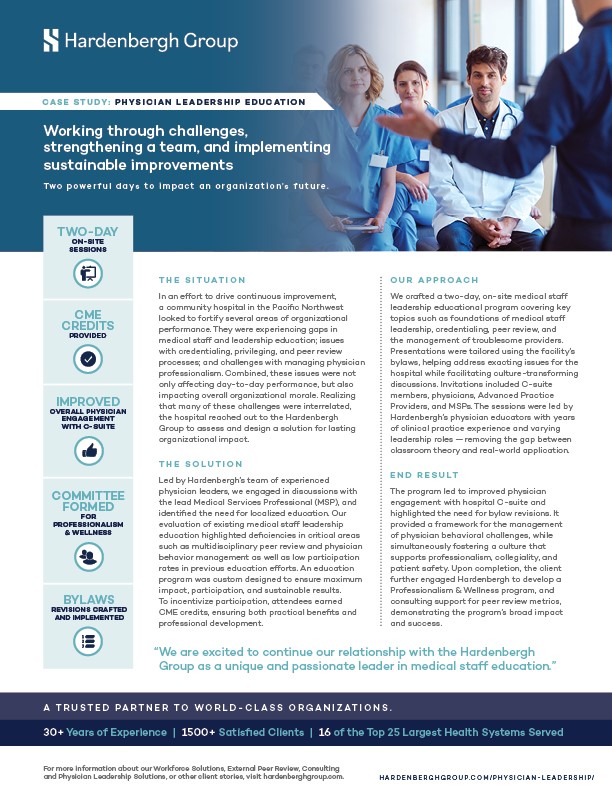In an effort to drive continuous improvement, a community hospital in the Pacific Northwest looked to fortify several areas of organizational performance. They were experiencing gaps in medical staff and leadership education, issues with credentialing, privileging, and peer review processes, and challenges with managing physician professionalism. Combined, these issues were not only affecting day-to-day performance, but also impacting overall organizational morale. Realizing that many of these challenges were interrelated, the hospital reached out to The Hardenbergh Group to assess and design a solution for lasting organizational impact.
Led by Hardenbergh’s team of experienced physician leaders, we engaged in discussions with the lead Medical Services Professional (MSP), and identified the need for localized education. Our evaluation of existing medical staff leadership education highlighted deficiencies in critical areas such as multidisciplinary peer review and physician behavior management as well as low participation rates in previous education efforts. An education program was custom designed to ensure maximum impact, participation, and sustainable results. To incentivize participation, attendees earned CME credits, ensuring both practical benefits and professional development.
We crafted a two-day, on-site medical staff leadership educational program covering key topics such as foundations of medical staff leadership, credentialing, peer review, and the management of troublesome providers. Presentations were tailored using the facility’s bylaws, helping address exacting issues for the hospital while facilitation culture-transforming discussions. Invitations included C-suite members, physicians, Advanced Practice Providers, and MSPs. The sessions were led by Hardenbergh’s physician educators with years of clinical practice experience and varying leadership roles – removing the gap between classroom theory and real-world application.
The program led to improved physician engagement with hospital C-suite and highlighted the need for bylaws revisions. It provided a framework for the management of physician behavioral challenges, while simultaneously fostering a culture that supports professionalism, collegiality, and patient safety. Upon completion, the client further engaged Hardenbergh to develop a Professionalism & Wellness program, and consulting support for peer review metrics, demonstrating the program’s broad impact and success.
At the conclusion of the program, the client commented:
ON-SITE SESSIONS
PROVIDED
OVERALL PHYSICIAN ENGAGEMENT WITH C-SUITE
FOR PROFESSIONALISM & WELLNESS
REVISIONS CRAFTED AND IMPLEMENTED
